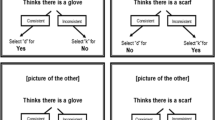Abstract
The current work reports 2 experiments that investigate the development of false belief from the perspective of Relational Frame Theory. The true and false belief test protocol used across both experiments contained a range of tasks that involved responding in accordance with the 3 perspective-taking frames of I-YOU, HERE-THERE, NOW-THEN, and in accordance with logical NOT. Experiment 1 involved the presentation of a protocol containing 10 true/false tasks to participants of 5 age groups ranging from 3 to 30 years old. Experiment 2 was identical to Experiment 1, except that the number of tasks presented in the protocol was increased to 60 and novel participants were employed. The results of both experiments indicated a developmental trend in which accuracy on the protocol appeared to increase as a function of age. Furthermore, the fact that neither study indicated a statistically significant effect for trial type suggested that responding to both true and false belief may involve overlapping behavioral processes. The findings are discussed in terms of their implications for Relational Frame Theory, behavior analysis, and the mainstream developmental literature on understanding true and false belief.
Similar content being viewed by others
References
BARON-COHEN, S., TAGER-FLUSBERG, H., & COHEN, D. (2000). Understanding other minds: Perspectives from developmental cognitive neuroscience (2nd ed.). Oxford: Oxford University Press.
BARNES-HOLMES, Y., BARNES-HOLMES, D., & CULLINAN, V. (2001). Education. In S. C. Hayes, D. Barnes-Holmes, & B. Roche (Eds.), Relational frame theory: A post-Skinnerian account of human language and cognition. New York: Plenum.
BENNET, J. (1978). Some remarks about concepts. Behavioural and Brain Sciences, 1, 557–560.
DYMOND, S., & BARNES, D. (1995). A transformation of self-discrimination response functions in accordance with the arbitrarily applicable relations of sameness and opposition. The Psychological Record, 46, 271–300.
GOPNIK, A., & ASTINGTON, J. (1988). Children’s understanding of representational change and its relation to the understanding of false belief and the appearance reality distinction. Child Development, 59, 26–37.
HAYES, S. C., BARNES-HOLMES, D., & ROCHE, B. (2001). Relational frame theory: A post-Skinnerian account of human language and cognition. New York: Plenum.
HAYES, S. C., BLACKLEDGE, J. T., & BARNES-HOLMES, D. (2001). Language and cognition: Constructing an alternative approach within the behavioral tradition. In S. C. Hayes, D. Barnes-Holmes, & B. Roche (Eds.), Relational frame theory: A post-Skinnerian account of human language and cognition (pp. 3–21). New York Plenum.
HAYES, S. C., HAYES, L. J. (1992) Verbal relations and the evolution of behaviour. analysis. American Psychologist, 47, 1383–1395.
HOWLLN, P., BARON-COHEN, S., & HADWIN, J. (1999). Teaching children with autism to mind-read: A practical guide. Chichester, England: Wiley.
JOHNSON-LAIRD, P. N. (1983). Mental models. Cambridge: Cambridge University Press.
LIPKENS, R., HAYES, S. C., & HAYES, L. J. (1993). Longitundinal study of the development of derived relations in an infant. Journal of Experimental Child Psychology, 51, 201–239.
MCHUGH, L., BARNES-HOLMES, Y., & BARNES-HOLMES, D. (2004). Developmental trends in perspective-taking. The Psychological Record, 54, 115–145.
MOSSLER, D. (1976). Conceptual perspective-taking in 2- to 6-year old children. Developmental Psychology, 12, 85–86.
PERNER, J., FRITH, U., LESLIE, A. M., & LEEKAM, S. (1989). Exploration of the autistic child’s theory of mind: knowledge, belief, and communication. Child Development, 60, 689–700.
PERNER, J., LEEKAM, S., & WIMMER, H. (1987). Three year olds’ difficulty with false belief. The case for a conceptual deficit. British Journal of Developmental Psychology, 5, 125–137.
SODIAN, B., & FRITH, U. (1992). Deception and sabotage in autistic, retarded and normal children. Journal of Experimental Psychology: General, 113, 130–136.
STEELE, D. L., & HAYES, S. C. (1991). Stimulus equivalence and arbitrarily applicable relational responding. Journal of the Experimental Analysis of Behavior, 56, 519–555.
STEWART, I., & BARNES-HOLMES, D. (2001). Understanding metaphor: A relational frame perspective. The Behavior Analyst, 24, 191–199.
TAYLOR, M. (1988). Conceptual perspective taking: Children’s ability to distinguish what they know from what they see. Child Development, 59, 703–718.
WIMMER, H., & PERNER, J. (1983). Beliefs about beliefs: representation and constraining function of wrong beliefs in young children’s understanding of deception. Cognition, 13, 103–128.
WOODRUFF, G., & PREMACK, D. (1979). Intentional communication in the chimpanzee: The development of deception. Cognition, 33, 333–362.
WULFERT, E., & HAYES, S. C. (1988). Transfer of conditional ordering response through conditional equivalence classes. Journal of the Experimental Analysis of Behaviour, 50, 125–144.
Author information
Authors and Affiliations
Corresponding author
Rights and permissions
About this article
Cite this article
Mchugh, L., Barnes-Holmes, Y., Barnes-Holmes, D. et al. Understanding False Belief as Generalized Operant Behavior. Psychol Rec 56, 341–364 (2006). https://doi.org/10.1007/BF03395554
Published:
Issue Date:
DOI: https://doi.org/10.1007/BF03395554



